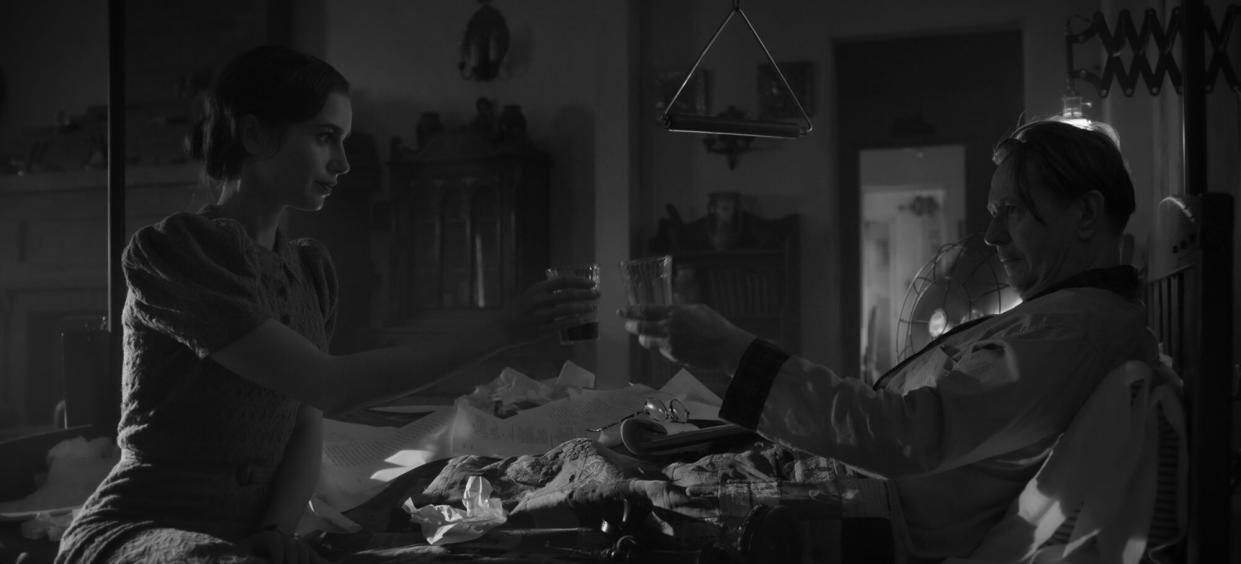David Fincher (sort of) takes on a Hollywood legend in heady Netflix drama Mank : Review

- Oops!Something went wrong.Please try again later.
- Oops!Something went wrong.Please try again later.
Netflix
It takes no small audacity to make a movie about the making of the greatest movie of all time. Even a director as lauded as David Fincher — he of the Zodiacs and Social Networks and Gone Girls, the Oscar nods and Emmys and Golden Globes — only really comes at Citizen Kane sideways in the loose biopic Mank, due in select theaters Nov. 13 and on Netflix Dec. 4.
The film does give us our Orson Welles, still on the bright cusp of his career, via British actor Tom Burke (The Souvenir). Though it's hardly a portrait of the auteur as a young man; instead, Fincher shifts his lens to Gary Oldman as Herman J. Mankiewicz, the slubbish drama-critic-turned-screenwriter whose quick wit and ability to fix a broken script (often uncredited) made him an industry legend.
So too did his prodigious drinking; as the story — shot in creamy black-and-white and overlaid with the typewriter clacks and slow dissolves of old-fashioned scene cues — opens, the man they call Mank has been sent to dry out on a remote Southern California ranch. Still wrecked from a recent car accident, he has the full use of a proper German nurse (Monika Grossman) and a secretary (Lily Collins, in stiff-spined English-rose mode) — ostensibly to aid in his recovery, but largely to squeeze out the promised screenplay that Welles and his financial backers are desperately waiting on.
They, and Fincher's audience, will need to gird their loins for what follows: a leisurely, time-looped ramble through the addled banks of Mank's recent memory. Here he is tipsily disparaging the Wizard of Oz script while his long-suffering wife, Sarah (Tuppence Middleton), pours him into bed; there he is meeting Welles for the first time, or driving studio executives mad with his casual disdain for both authority and deadlines.
For many years, that wit managed to carry him past the twinned pitfalls of ego and alcohol — particularly with William Randolph Hearst (Game of Thrones' Charles Dance), the legendary newspaper tycoon whose outsize life and eccentricities would infamously make him a muse for Citizen's lonely mogul Charles Foster Kane.
If the real Hearst's soft spot for an incurably irreverent, habitually inebriated movie scribe seems improbable at best, it appeared to help that his longtime mistress, Marion Davies (played here with plucky, lemur-eyed vulnerability by Amanda Seyfried), had her own enduring fondness for him too.
A girl from working-class Brooklyn who went on to become an early screen ingenue and then the longtime lover of one of the world's wealthiest men (at the cost, it turned out, of much of her career), Davies — unaware to what extent her own life's narrative will be shaped by the very movie Mank is working on — acts as a sort of sweet conscience and sounding board. So, to lesser degrees of success, do Herman's wife, his brother (Tom Pelphrey), and nearly everyone else trying to push him over the finish line and protect him from himself.
Oldman, who picked up an Oscar nearly three years ago for his turn as Winston Churchill in The Darkest Hour, leans gleefully into Mankiewicz's messy joie de vivre; a figure far too clever for his own good, and too self-aware not to know it. Fincher also seems to revel in his telling, faithfully recreating the ring-a-ding speech rhythms and lush scene setting of Hollywood's Golden Age (while also managing to slip in a surprising amount about regional California politics circa the tail end of the Great Depression).
What the script — penned by Fincher's late father, Jack, who passed away in 2003 — never quite cracks is the machinery of the creative process. On the rare occasions that Mank actually gets down to the business of writing, he tends to do so as if channeling directly from some enchanted, untraceable fount; not so much a man as a medium. The story then becomes less a forensic accounting of a masterpiece than a bittersweet ode to a certain slice of old Hollywood: part love letter, part cautionary tale, and still somehow a mystery. Grade: B+
Related content:

